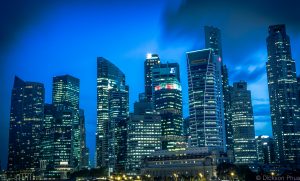Singapore’s government has come under fire after revealing that data gathered by its official COVID-19 contact tracing app could be accessed by police conducting criminal investigations, contradicting earlier assurances of privacy.
When the Bluetooth-enabled TraceTogether app was launched in March of last year, the Singaporean government encouraged people to sign up by assuring them that their privacy would be safeguarded. The software’s privacy statement promised that data gathered by the app would “only be used solely for contact tracing of persons possibly exposed to COVID-19.”
Similarly explicit promises were offered by Foreign Minister Vivian Balakrishnan in June, when he told a press conference, “TraceTogether app, TraceTogether running on a device, and the data generated, is purely for contact-tracing. Period.”
On January 4, however, Minister of State for Home Affairs Desmond Tan told the Singaporean parliament that data can also be used “for the purpose of criminal investigation.”
The same day, the app’s privacy statement was hurriedly updated to state that “TraceTogether data may be used in circumstances where citizen safety and security is or has been affected…The Singapore Police Force is empowered under the CPC [Criminal Procedure Code] to obtain any data, including TraceTogether data, for criminal investigations.”
Around four-fifths of Singapore’s population have signed up to the TraceTogether app, which was jointly developed by the Ministry of Health and the Government Technology Agency. It is used to create a record of movements that can be used to quickly contain any outbreak of COVID-19, and at the time of its introduction, was hailed as the advance guard in global measures to prevent outbreaks of the virus.
At first, use of the TraceTogether app was optional. In October, the government declared that checking in with the TraceTogether app or Bluetooth token would be mandatory at all public venues in Singapore, including restaurants, workplaces, schools, and shopping malls, from the start of 2021. The app was earlier made mandatory for migrant workers, after a spike in COVID-19 cases in dormitories housing workers from overseas.
The news has been greeted with anger by civil rights activists in Singapore. Speaking to the BBC, Kirsten Han, a local journalist and activist who raised questions about the privacy implications of the app back in March, expressed disappointment that her worries had been validated. Elsewhere she wrote that the backtracking could undermine Singaporeans’ generally high levels of trust in their government.
“Public trust, once damaged, can be very hard to regain, and can have other detrimental effects,” Han wrote. “Singapore’s contact-tracing efforts might now be undermined as people seek ways to circumvent or subvert the TraceTogether system because they no longer trust the government’s reassurances.” Other Singaporeans have also expressed their anger about the government’s revelation.
The Singaporean move is consistent with the extension of surveillance and other political controls in other Southeast Asian countries under the cover of COVID-19. Phil Robertson of the U.S.-based organization Human Rights Watch, said that the revelation “exposes how the government has been covertly exploiting the pandemic to deepen its surveillance and control over the population, and undermine the right to privacy.” (Han also noted that the TraceTogether app now requires users to share more information than when it was launched last year.)
For its own part, the government has attempted to write this all up as an honest mistake. In remarks to parliament, Balakrishnan said he was unaware that the CPC gave the police the authority to use COVID-19 tracing data in criminal investigations. Meanwhile, Law and Home Affairs Minister K Shanmugam promised parliament that the use of TraceTogether data in criminal investigations would be “restricted to very serious offenses.”
Given this week’s reversal, however, some Singaporeans could be forgiven for thinking twice before using the app.“What we have, here, then, is just their word, in the same way that Balakrishnan’s June 2020 statement about TraceTogether was his word,” Han wrote. “And we’ve all seen how that turned out.”

































